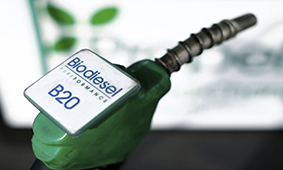
Dubai biodiesel producer Neutral Fuels expands

The company sources used cooking oil (UCO) feedstock from domestic suppliers and sells exclusively to the domestic market in each location.
A plant in South Africa with 4,700 t/yr of B100 production capacity will open later this year, following expansion into India's Delhi and Bahrain in 2019 with B100 plants of 4,700 t/yr and 2,400 t/yr respectively. Funds raised from green bonds listed on Germany's Frankfurt stock exchange in 2019 are partly financing the company's growth.
Pure B100 biodiesel production at its UAE operations will increase by 4,700t to 11,800t this year, said Neutral Fuels chief executive Karl Feilder. Blended B5 output will consequently rise to 237,000t in 2020 from just over 118,000t in 2019. This additional capacity will come from a plant launching in Abu Dhabi in the next few months to bolster total UAE production along with its existing Dubai plant.
Neutral Fuels does not intend to sell its product internationally, even with its B100 certified to Europe's EN14214 biodiesel standard. It instead seeks to enhance waste-based biodiesel consumption in the regions where it is located by replicating the localised supply chain model used in its Dubai operations. Supplies of UCO are obtained on term contracts from partners such as McDonald's, Nestle, Del Monte and Ikea, processed and blended at Neutral Fuels' own plants and sold directly to domestic consumers including school and corporate bus fleets.
Eurostat recorded 3,200t of UCO imports to the EU from the UAE during January-February and a total of 13,800t in 2019, which amounts to 90pc of total collections in the UAE, according to Feilder. The Dubai government is considering a ban on exports of valuable raw materials, including UCO, which would increase the percentage of waste feedstocks available for domestic processing.
Collecting and processing waste feedstocks locally is the "future of this industry", Feilder said, as it allows for greater emissions reductions and refined production processes tailored to domestic feedstock chemistry. Neutral Fuels' product is certified in Germany to meet the ISCC and Nabisy carbon footprint reduction verifications.
The UAE currently does not mandate diesel blending, with customers buying Neutral Fuels products entirely to meet company corporate social responsibility commitments. A localised model of waste feedstock biodiesel production is feasible and profitable without such government legislation, Feilder said, with its company revenues increasing by 25pc in March compared with February.
By Lauren Moffitt


Trump weighs using $2 billion in CHIPS Act funding for critical minerals

Codelco cuts 2025 copper forecast after El Teniente mine collapse

Electra converts debt, launches $30M raise to jumpstart stalled cobalt refinery

Barrick’s Reko Diq in line for $410M ADB backing

Abcourt readies Sleeping Giant mill to pour first gold since 2014

Nevada army depot to serve as base for first US strategic minerals stockpile

SQM boosts lithium supply plans as prices flick higher

Viridis unveils 200Mt initial reserve for Brazil rare earth project

Tailings could meet much of US critical mineral demand – study

Kyrgyzstan kicks off underground gold mining at Kumtor

Kyrgyzstan kicks off underground gold mining at Kumtor

KoBold Metals granted lithium exploration rights in Congo

Freeport Indonesia to wrap up Gresik plant repairs by early September

Energy Fuels soars on Vulcan Elements partnership

Northern Dynasty sticks to proposal in battle to lift Pebble mine veto

Giustra-backed mining firm teams up with informal miners in Colombia

Critical Metals signs agreement to supply rare earth to US government-funded facility

China extends rare earth controls to imported material

Galan Lithium proceeds with $13M financing for Argentina project

Kyrgyzstan kicks off underground gold mining at Kumtor

Freeport Indonesia to wrap up Gresik plant repairs by early September

Energy Fuels soars on Vulcan Elements partnership

Northern Dynasty sticks to proposal in battle to lift Pebble mine veto

Giustra-backed mining firm teams up with informal miners in Colombia

Critical Metals signs agreement to supply rare earth to US government-funded facility

China extends rare earth controls to imported material

Galan Lithium proceeds with $13M financing for Argentina project

Silver price touches $39 as market weighs rate cut outlook

















